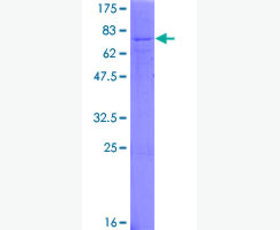Recombinant Human Alkaline Phosphatase/ALPL
| Product name: | Recombinant Human Alkaline Phosphatase/ALPL |
| Source: | Human Cells |
| Purity: | Greater than 95% as determined by reducing SDS-PAGE. |
| Buffer Formulation: | Supplied as a 0.2 μm filtered solution of 20mM HEPES, 150mM NaCl, 2mM MgSO4, 0.1mM ZnCl2, pH 7.5. |
| Applications: | Applications:SDS-PAGE; WB; ELISA; IP. |
| Storage: | Avoid repeated freeze/thaw cycles. Store at 2-8 oC for one month. Aliquot and store at -80 oC for 12 months. |
| UOM: | 100ug/50ug/200ug/1mg/1g |
| Source | Human Cells |
| Description | Recombinant Human Alkaline Phosphatase is produced by our Mammalian expression system and the target gene encoding Leu18-Ser502 is expressed with a 6His tag at the C-terminus. |
| Names | Alkaline Phosphatase, Tissue-Nonspecific Isozyme, AP-TNAP, TNSALP, Alkaline Phosphatase Liver/Bone/Kidney Isozyme, ALPL |
| Accession # | P05186 |
| Formulation | Supplied as a 0.2 μm filtered solution of 20mM HEPES, 150mM NaCl, 2mM MgSO4, 0.1mM ZnCl2, pH 7.5. |
| Shipping |
The product is shipped on dry ice/ice packs. |
| Storage |
Store at < -20°C, stable for 6 months after receipt. Please minimize freeze-thaw cycles. |
| Biological Activity |
Special Activity: 66 U/mg based on useing p-nitrophenyl phosphate (pNPP) as a phosphatase substrate which turns yellow (λmax= 405 nm) when dephosphorylated by ALP. At pH10.4, 37⁰C, 1 Unit is defined as cleaving 1.0 µmol p-nitrophenyl phosphate (pNPP) per minute. |
| Purity |
Greater than 95% as determined by reducing SDS-PAGE. |
| Endotoxin | Less than 0.1 ng/µg (1 IEU/µg) as determined by LAL test. |
| Amino Acid Sequence |
LVPEKEKDPKYWRDQAQETLKYALELQKLNTNVAKNVIMFLGDGMGVSTVTAARILKGQLHHNPG EETRLEMDKFPFVALSKTYNTNAQVPDSAGTATAYLCGVKANEGTVGVSAATERSRCNTTQGNEV TSILRWAKDAGKSVGIVTTTRVNHATPSAAYAHSADRDWYSDNEMPPEALSQGCKDIAYQLMHNI RDIDVIMGGGRKYMYPKNKTDVEYESDEKARGTRLDGLDLVDTWKSFKPRYKHSHFIWNRTELLT LDPHNVDYLLGLFEPGDMQYELNRNNVTDPSLSEMVVVAIQILRKNPKGFFLLVEGGRIDHGHHE GKAKQALHEAVEMDRAIGQAGSLTSSEDTLTVVTADHSHVFTFGGYTPRGNSIFGLAPMLSDTDK KPFTAILYGNGPGYKVVGGERENVSMVDYAHNNYQAQSAVPLRHETHGGEDVAVFSKGPMAHLLH GVHEQNYVPHVMAYAACIGANLGHCAPASSVDHHHHHH
|
| Background | Alkaline Phosphatase, Tissue-Nonspecific Isozyme (ALPL) is a cell membrane protein which belongs to the alkaline phosphatase family. There are at least four distinct but related alkaline phosphatases in humans: intestinal AP (IAP), placental AP(PLAP), germ cell AP (GCAP) and their genes are clustered on chromosome 2, tissue-nonspecific isozyme (TNAP) which gene is located on chromosome 1. Alkaline phosphatases (APs) are dimeric enzymes, it catalyze the hydrolysis of phosphomonoesters with release of inorganic phosphate. The native ALPL is a glycosylated homodimer attached to the membrane through a GPI-anchor. This isozyme may play a role in skeletal mineralization. Mutations in ALPL gene have been linked directly to different forms of hypophosphatasia,characterized by poorly mineralized cartilage and bones, and this disorder can vary depending on the specific mutation since this determines age of onset and severity of symptoms. |
| Source | Human Cells |
| Description | Recombinant Human Alkaline Phosphatase is produced by our Mammalian expression system and the target gene encoding Leu18-Ser502 is expressed with a 6His tag at the C-terminus. |
| Names | Alkaline Phosphatase, Tissue-Nonspecific Isozyme, AP-TNAP, TNSALP, Alkaline Phosphatase Liver/Bone/Kidney Isozyme, ALPL |
| Accession # | P05186 |
| Formulation | Supplied as a 0.2 μm filtered solution of 20mM HEPES, 150mM NaCl, 2mM MgSO4, 0.1mM ZnCl2, pH 7.5. |
| Shipping |
The product is shipped on dry ice/ice packs. |
| Storage |
Store at < -20°C, stable for 6 months after receipt. Please minimize freeze-thaw cycles. |
| Biological Activity |
Special Activity: 66 U/mg based on useing p-nitrophenyl phosphate (pNPP) as a phosphatase substrate which turns yellow (λmax= 405 nm) when dephosphorylated by ALP. At pH10.4, 37⁰C, 1 Unit is defined as cleaving 1.0 µmol p-nitrophenyl phosphate (pNPP) per minute. |
| Purity |
Greater than 95% as determined by reducing SDS-PAGE. |
| Endotoxin | Less than 0.1 ng/µg (1 IEU/µg) as determined by LAL test. |
| Amino Acid Sequence |
LVPEKEKDPKYWRDQAQETLKYALELQKLNTNVAKNVIMFLGDGMGVSTVTAARILKGQLHHNPG EETRLEMDKFPFVALSKTYNTNAQVPDSAGTATAYLCGVKANEGTVGVSAATERSRCNTTQGNEV TSILRWAKDAGKSVGIVTTTRVNHATPSAAYAHSADRDWYSDNEMPPEALSQGCKDIAYQLMHNI RDIDVIMGGGRKYMYPKNKTDVEYESDEKARGTRLDGLDLVDTWKSFKPRYKHSHFIWNRTELLT LDPHNVDYLLGLFEPGDMQYELNRNNVTDPSLSEMVVVAIQILRKNPKGFFLLVEGGRIDHGHHE GKAKQALHEAVEMDRAIGQAGSLTSSEDTLTVVTADHSHVFTFGGYTPRGNSIFGLAPMLSDTDK KPFTAILYGNGPGYKVVGGERENVSMVDYAHNNYQAQSAVPLRHETHGGEDVAVFSKGPMAHLLH GVHEQNYVPHVMAYAACIGANLGHCAPASSVDHHHHHH
|
| Background | Alkaline Phosphatase, Tissue-Nonspecific Isozyme (ALPL) is a cell membrane protein which belongs to the alkaline phosphatase family. There are at least four distinct but related alkaline phosphatases in humans: intestinal AP (IAP), placental AP(PLAP), germ cell AP (GCAP) and their genes are clustered on chromosome 2, tissue-nonspecific isozyme (TNAP) which gene is located on chromosome 1. Alkaline phosphatases (APs) are dimeric enzymes, it catalyze the hydrolysis of phosphomonoesters with release of inorganic phosphate. The native ALPL is a glycosylated homodimer attached to the membrane through a GPI-anchor. This isozyme may play a role in skeletal mineralization. Mutations in ALPL gene have been linked directly to different forms of hypophosphatasia,characterized by poorly mineralized cartilage and bones, and this disorder can vary depending on the specific mutation since this determines age of onset and severity of symptoms. |














